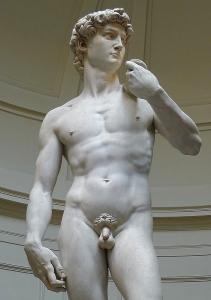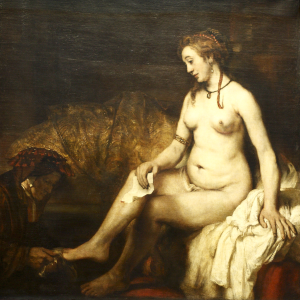 David was bored. Even though his aging general Joab had called for fresh combat against the Ammonites, since the dry spring had begun, and the earth again was suitable for chariot fighting and fast-moving ground troops, David for the first time in his warrior life was uninterested. He knew this was the season when kings went forth to battle, but once he had finally defeated the pesky Philistines, who for countless suns had threatened Israelite power, the king had retired to his luxurious palace and had attended to his pleasurable duties of creating heirs. He had seven wives—or was it eight?—and sons and daughters far too numerous to count with names that had a way of slipping his mind; he saw some of them so rarely that their faces melded together until he did not know which was which.
David was bored. Even though his aging general Joab had called for fresh combat against the Ammonites, since the dry spring had begun, and the earth again was suitable for chariot fighting and fast-moving ground troops, David for the first time in his warrior life was uninterested. He knew this was the season when kings went forth to battle, but once he had finally defeated the pesky Philistines, who for countless suns had threatened Israelite power, the king had retired to his luxurious palace and had attended to his pleasurable duties of creating heirs. He had seven wives—or was it eight?—and sons and daughters far too numerous to count with names that had a way of slipping his mind; he saw some of them so rarely that their faces melded together until he did not know which was which.
The Ammonites were barely a worthy opponent for an increasingly potent Israelite army, and David knew that his presence or absence meant little. An Israelite victory was assured, and the king had only to await the news of Joab’s triumph. Besides, it was finally too much trouble to put on his armor, heft his sword and sling, and ride forth, shouting and screaming the warrior hymn. Let the younger men thrill to all that! I would far rather loll on this royal couch and choose from a luscious brood of superb women. Still, the king mused, it would be wonderful for some new experience, anything to break the tedium that enveloped him.
Late one afternoon, after a lovely nap, the king, lying on a rich pile of carpets on the top of his palace in the cool spring sunshine, gazed eastward, away from the setting sun. This time his gazed was rewarded by an astonishing and titillating sight. There was a woman—what a woman!—bathing openly on her rooftop, her brown and nubile body just at the moment exiting the bath, reaching calmly for a large towel to cover her achingly beautiful form. David held his breath, hoping that the spectacular creature would delay her covering long enough for him to drink his fill of her exquisite loveliness. She finally grabbed the towel, but took a long time to complete the drying of every part of her. David was transfixed, and shouted to his servant, “Who is that woman?” The king tried to make his voice calm, but could not keep the lustiness out of his cry. “It is Bathsheba, daughter of Eliam, wife of Uriah the Hittite,” the old man answered, not missing the longing in the king’s voice, but not betraying what he clearly heard. “Bring her to me,” the king commanded, and soon the woman was at the palace, and soon she was in the king’s commodious bed.
 Night after superb night, David and Bathsheba coupled, sometimes roughly and urgently, other times languidly and slowly. Two months passed, and barely a single night did not find the lovers together. All too soon, Bathsheba looked up at David and said she was pregnant. No use softening the blow; their wild love had produced what such love produces, and David had tomake a choice. She was a wife to one of David’s able foreign generals, the much-heralded Uriah, a huge and stunning warrior, honored by his men and hardly unknown to his king. David could simply call the man home from Ammon’s walls and tell him that he wanted his wife, and since he was king he meant to have her. Yet, such an action seemed crude, beneath the dignity of a king, so David made a different choice.
Night after superb night, David and Bathsheba coupled, sometimes roughly and urgently, other times languidly and slowly. Two months passed, and barely a single night did not find the lovers together. All too soon, Bathsheba looked up at David and said she was pregnant. No use softening the blow; their wild love had produced what such love produces, and David had tomake a choice. She was a wife to one of David’s able foreign generals, the much-heralded Uriah, a huge and stunning warrior, honored by his men and hardly unknown to his king. David could simply call the man home from Ammon’s walls and tell him that he wanted his wife, and since he was king he meant to have her. Yet, such an action seemed crude, beneath the dignity of a king, so David made a different choice.
The woman may be pregnant—he trusted Bathsheba knew her body well—but that was hardly clear to anyone seeing her, her belly still flat and comely as always. Why not invite Uriah to come home, sleep with his wife, and make the coming child his own. Who would be the wiser? Children often come early, and if the child showed some trace of the ruddy David, well, the appearance of babies was ever strange and uncertain.
And so David demanded the return of Uriah from Ammon, and he came at his king’s command. After a brief banter about the battle and Joab and the weather, David urged Uriah to go home and “wash his feet,” meaning as any soldier knew that Uriah could go home to his lovely spouse and make love to her after the long days apart from her beauty. But Uriah did not, but slept in the streets with the king’s servants, claiming the next day that he simply could not enjoy the charms of Bathsheba while his loyal men were fighting and dying at Ammon. And though David plied him with drink, and kicked him in the direction of his house and his wife, Uriah again slept in the streets. And David had a problem.
So this time the king wrote a letter to Joab, his faithful amoral thug, demanding that Uriah be placed at the most dangerous place in the battle in order that he might be killed. And he gave the note to Uriah, knowing the loyal man would never dare read a missive from his king to his general. When Joab read the note from David, he shook his head in wonder that David had descended to this, a craven murderer. But also, he noted how ridiculous the plan hatched by the king was. Set Uriah at the place of hard fighting, draw back from him, and watch him die? Absurd and dangerous. What will the men think as Uriah faces the Ammonite warriors alone, while they escape to safety? Better to sacrifice a few of those men to cover the death of Uriah, thought Joab. Exactly why David wanted Uriah dead was of no concern to Joab; his king commanded and he obeyed. And Uriah died in a hail of arrows and spears along with twelve other Israelite men, brave soldiers all.
And Uriah carefully briefed the soldier chosen to bring the news to the king. “You must tell the king of Uriah’s death, but you must do so in a certain way. The king, a very sensitive man, upon hearing of the death of his great general, may wail and shout and cry out that we should not have gone so close to the wall, that we needed to remember how Abimelech, an ancient Israelite leader, was killed in a similar way—had we forgotten that? If he does all that, just announce then that Uriah is dead, and that should calm him nicely. But the messenger was terrified of his king, knowing the several stories of the king’s killing of messengers who brought news he did not like, so when he was ushered into the throne room, he simply could not delay the news he was sent to bring, and so quickly blurted out that Uriah was dead.
David did not wail or shout or offer a history lesson about ancient deaths, but very icily said, “Well, death happens. The sword takes now one and then another. My good man, tell general Joab that he has done well,” and laying a royal hand on the man’s shoulder, he urged him to rest and drink and return to Ammon. And after the prescribed number of mourning days, and not one day more, Bathsheba came to the palace of David and became wife of the king. And from that day, the fate of David was sealed. All the rest of his life was cankered with sibling rivalries and assaults and murders until a freezing king, alone in his commodious bed, could only call down curses on old enemies and die, cold and alone.
Images from Wikimedia Commons











